Hello, HUMAN IN LOVE family! This is Seong, Hae-shin working in Rwanda and Burundi.
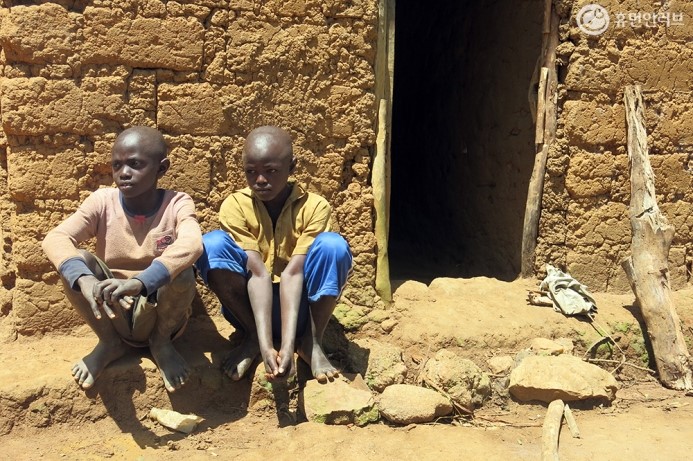
[ Beatrice (left, age 13) and her elder brother Jean Pierre (right, age 14) dropped out of school due to family circumstances. ]
According to an official statistics announced by United Nations Educational, Scientific and Cultural Organization (the most recent data was announced in 2012), a whopping 58 million children around the world are not attending school. Among them, almost half of the students (51%) are from sub-Saharan African countries. In addition, four out of ten primary school students in this region give up their studies halfway through. Graduation rate of primary school students of Rwanda and Burundi are 36% and 44%, respectively, falling short of 50%.
HUMAN IN LOVE visited two families living in Ruzo area of Rweru Sector for survey. The principal and a teacher of Ruzo Primary School accompanied us.
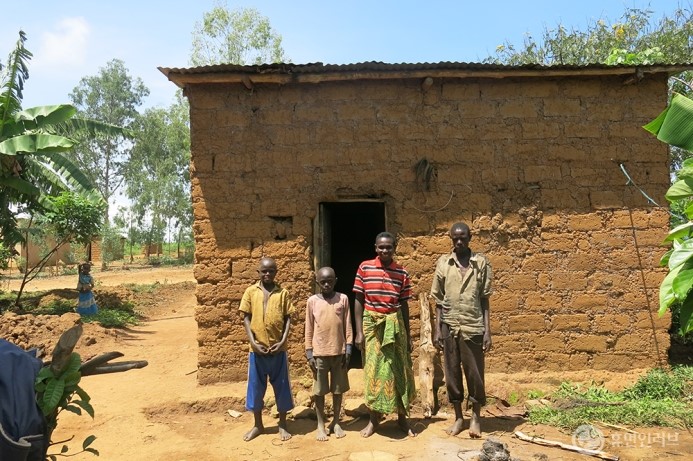
[ Our first visit was to Jean Pierre’s house ]
The first house we visited was the house of Jean Pierre (age 14), a fourth grader of Ruzo Primary School. Jean Pierre’s younger siblings Beatrice and De Dieu (age 10)used to go to school, but after their father got into an accident and became disabled, their financial situation took a dive, making them to quit school. When we were talking with his parents, Jean Pierre brought the textbooks of Beatrice and De Dieu which they used the year before, saying that he wish his siblings can go to school again.
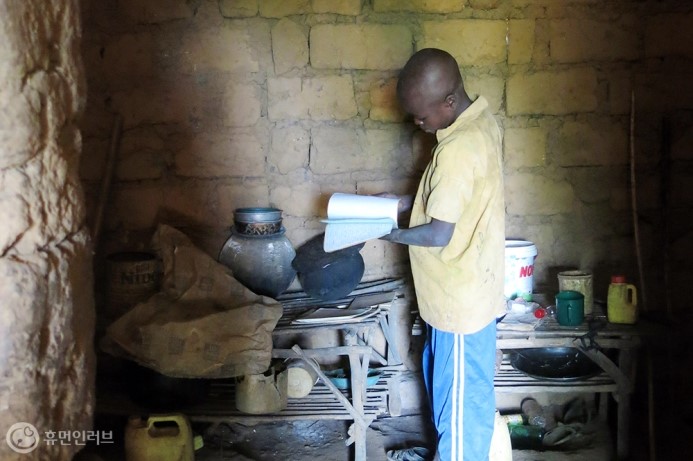
[ Jean Pierre is looking at his sister’s notebook. ]
The Rwandan government provides primary and secondary education free of cost, so we asked Jean Pierre’s parents why their children had to quit school.
“Why don’t you send your children to school? Isn’t it free of charge?”
“Just sending our children to school is not all of the story. We have to prepare their meals, but after their father became disabled, the only breadwinner of our family cannot work anymore. So, the children have to help their father’s work to barely make ends meet. Of course, there is no tuition fee for the school, but we also have to prepare their school uniforms, supplies and meals. However, we cannot afford to prepare all three of our children’s school necessities, so we decided to only send our first son Jean Pierre to school and asked our second and third child to help their father.”
Jean Pierre and Beatrice were listening to this story with a somber look on their face. We were also heavy-hearted, listening to the story of these children who have to earn a living instead of going to school and be with their friends.
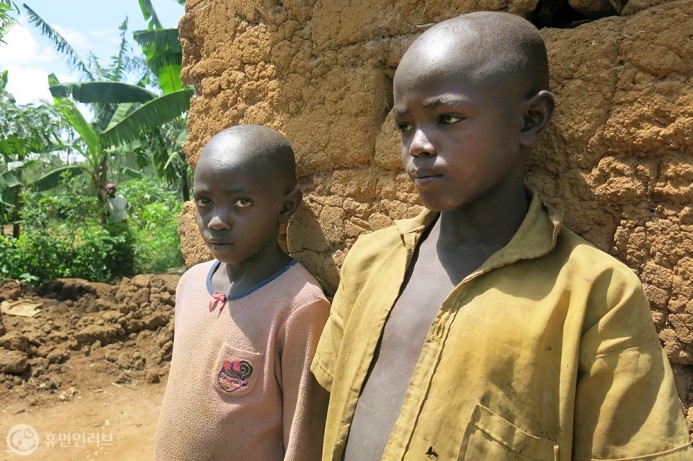
[ Beatrice (left) and Jean Pierre (right) ]
Jean Pierre’s family earn less than 30 USD per month on average by farming. The World Bank set that a person living with less than 1.95 USD (around 2,300 KRW) a day is living in absolute poverty, but Jean Pierre’s family fell much shorter than the absolute poverty line. In this situation, Jean Pierre’s father could not afford getting treatment after the accident and eventually became disabled. As a result, his children had to act as a breadwinner.
After talking with Jean Pierre’s family, we moved to the second house for visit.
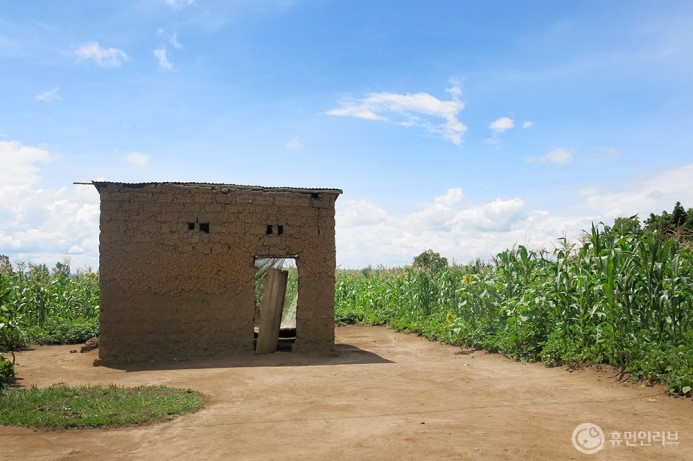
[ Our second visit was to Denis’ house ]
As our car arrived, the first thing we saw was a vacant lot and collapsed house. It was the house of Denis (age 8). In fact, the view surrounding the collapsed house was so beautiful, so we even thought that the collapsed house was part of the scene instead of a house where someone lives. The front of the house maintained the form of a house but when we looked at the backside, we saw that it was crumbled.
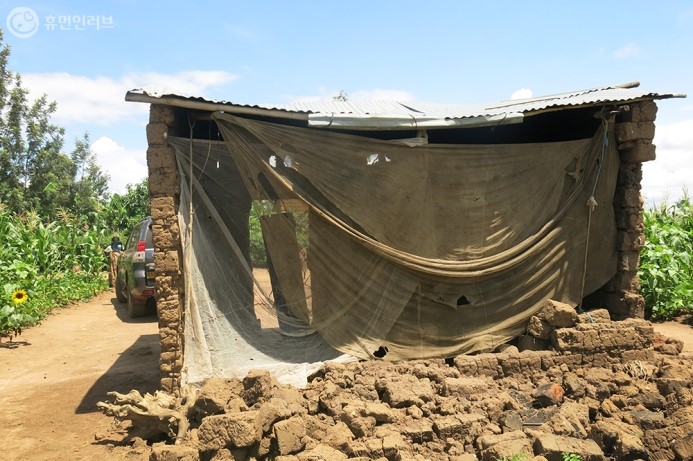
Traditional house of Rwanda is usually made of hand-made dried mud bricks, and since they are vulnerable to rain and storm, one has to repair the house frequently. That is why HUMAN IN LOVE has also carried out house-repairing project for our scholarship students. However, Denis’ family could not repair their house during the rainy season this year, so the back wall eventually caved in.
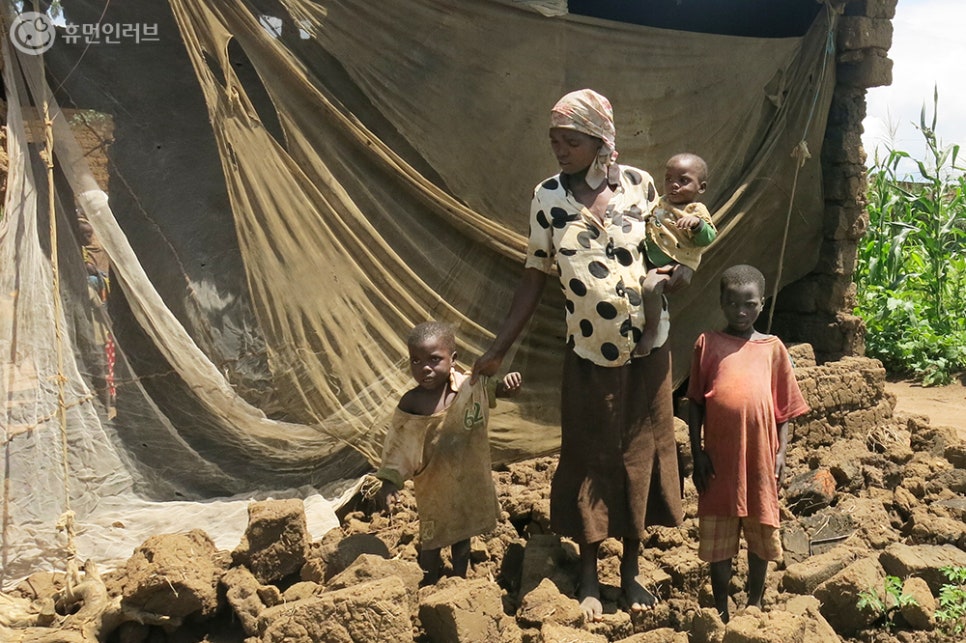
[ Our second visit was to Denis’ house ]
Denis’ father passed away last year, so his mother had to raise all five children on her own. She could not raise all of the children herself, so she had to send her eldest and third child to their grandmother. Currently, she is living with Denis and his two younger siblings at this dangerous house.
Teachers of Ruzo Primary School also became silent after looking at the house of Denis’ family. The collapsed wall was covered with fabric, and we could not even imagine how the children can live in this poor environment.
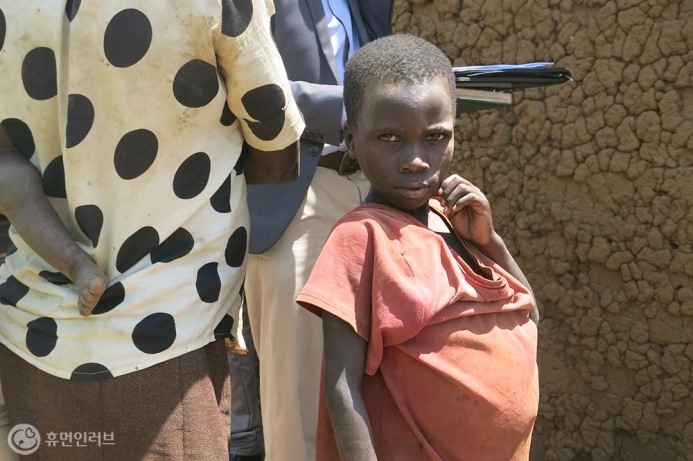
[ Denis shows symptoms of malnutrition ]
We conducted the visit on May 3, two days ahead of children’s day of Korea. There is no children’s day in Rwanda. Looking at the poor housing environment of the children, I remembered how I spent children’s day in Korea every year. The Rwandan government is also aware of this situation, and that is why they are providing primary education for free. However, Rwanda still has a long way to go and need much help. It was very sad and unfortunate to see the children working to make ends meet in this country.
I sincerely hope that these children can live a happier life as they grow up.

